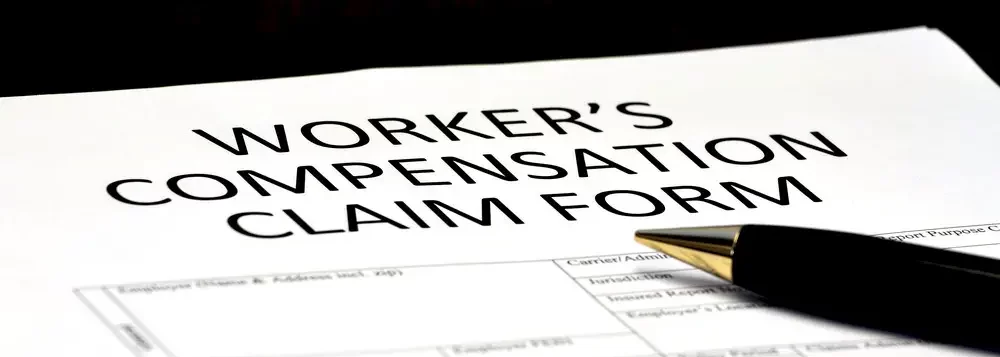Workers Comp vs Disability: Key Differences and Benefits Explained
Unsure whether you should submit a claim for workers’ compensation or disability insurance? This article explains the key differences between workers comp vs disability, showing you when each applies, what they cover, and how to choose the right one for your situation.
Key Takeaways
- Workers’ compensation provides financial support for work-related injuries, covering medical expenses and lost wages, while disability insurance offers income replacement for non-work-related injuries and illnesses.
- The primary differences between workers’ compensation and disability insurance include their coverage scope, benefit amounts, duration, and the legal implications involved in claims.
- Employees should file workers’ compensation claims for job-related injuries and apply for disability insurance benefits for non-work-related conditions, with legal assistance recommended in complex cases.
Understanding Workers’ Compensation
Employees who suffer from work-related injuries or illnesses are backed by workers’ compensation, a form of insurance specifically designed to cover medical costs and provide benefits while they recuperate.
An injured employee may need to navigate between workers’ compensation and disability benefits, especially when claims are denied, leading to potential legal consultations. This protection serves as a safeguard against the potential economic hardship that may arise following an injury connected with their employment, guaranteeing support for workers during times when they are most susceptible.
What is Workers’ Compensation?
Workers’ comp insurance serves as a mandatory safeguard for employees who suffer from occupational injuries or illnesses, ensuring coverage for related medical costs and compensating them for income lost during their recuperation. This program acts as a financial buffer against workplace-induced conditions, though its scope and advantages differ considerably due to the diverse regulations set by individual states.
Regardless of whether an employee is at fault in a workplace accident, they remain eligible for workers comp benefits. These entitlements are granted on the condition that the injury wasn’t self-inflicted or caused by drug or alcohol use. Such comprehensive protection offers essential support to workers in various sectors.
Who Needs Workers’ Compensation Insurance?
In the majority of states, businesses are obligated to secure workers’ compensation insurance for their employees. This requirement is aimed at offering financial security in cases where an employee sustains a work-related injury or illnesses that are connected to their work. The exact stipulations differ by state – Missouri enforces this obligation on any business with a minimum of five workers, whereas California insists even companies with just one worker must provide such coverage.
Should employers neglect acquiring workers’ compensation insurance, they may encounter harsh consequences including substantial fines and possible legal action against them. Having this type of insurance serves as a safeguard for employers from lawsuits related to workplace injuries.
Benefits of Workers’ Compensation
Workers’ compensation serves as a crucial support system for employees who sustain work-related injuries or illnesses. Its main function is to take care of the medical expenses incurred from such conditions, allowing access to required treatments without causing monetary hardships. It also provides benefits for lost wages, offering financial relief when an employee’s recovery period impacts their earnings.
In cases where an employee can return to work but their work-related injuries prevent them from earning the same salary they once did, workers’ compensation steps in to compensate for a fraction of this income discrepancy. This provision ensures that workers have the opportunity to concentrate on healing without being burdened by concerns over lost income.
Exploring Disability Insurance
While workers’ compensation covers work-related injuries, disability insurance handles non-work-related injuries and illnesses, providing crucial income replacement during incapacity.
Different types of disability insurance and their benefits ensure financial stability when medical circumstances prevent you from working.
What is Disability Insurance?
Disability insurance provides a financial safety net for individuals unable to work due to non-job-related medical circumstances. It replaces income, helping maintain their standard of living. Social Security Disability Insurance (SSDI) is a crucial program for individuals who have contributed to Social Security and are now facing disabilities, with specific eligibility criteria and benefits. There are two main types: short-term and long-term, each offering different support levels based on the duration and severity of the disability.
To qualify for disability insurance benefits, applicants must show that their medical condition significantly impairs their ability to work, typically by submitting medical documentation verifying the disability.
Unlike workers’ compensation, disability insurance benefits can be used for any purpose, not just medical expenses, offering broader financial protection.
Short-Term Disability Insurance
Disability insurance for the short term is designed to offer financial assistance over a brief duration, which can range from several weeks to multiple months as specified in the policy. This type of coverage supports individuals who must take leave from their jobs due to medical conditions not associated with work-related injuries, including illnesses or incidents warranting surgery or recuperation after giving birth. Depending on specific policies, it compensates between 40% and 100% of an individual’s income.
The criteria for qualifying for benefits under short-term disability require adherence to stipulations set forth by the insurance agreement. Certain states provide these benefits themselves. This state-sponsored support typically offers compensation that falls anywhere between slightly less than $100 and just above $1,000 weekly. Such funds are essential in aiding individuals through periods of recovery from temporary health issues.
Long-Term Disability Insurance
Individuals who are incapacitated and cannot work for an extended time due to serious health issues can receive sustained financial support through long-term disability insurance. This type of coverage substitutes between 50% and 70% of one’s income and has the potential to provide benefits over several years, occasionally extending until retirement.
Often acquired on a personal basis, long-term disability insurance may also be provided as elective coverage by some employers. There is usually a delay period, known as the elimination period, which spans 90 to 180 days before the commencement of benefit payments. Such enduring assistance ensures economic stability for individuals grappling with substantial disabilities.
Workers’ Compensation vs. Disability Insurance: Key Differences
Understanding the critical distinctions between workers’ compensation and disability insurance is essential for identifying which type of coverage suits particular situations best.
These variances are Classified into areas such as the extent of coverage, the magnitude and length of benefits provided, as well as their legal and fiscal consequences.
Coverage Scope
Workers’ compensation is specifically designed to provide benefits for medical expenses and compensation for wages lost due to injuries or illnesses that are directly related to the job. This type of insurance is tailored toward incidents occurring in the work environment. Public disability benefits, such as Social Security Disability Insurance (SSDI), can also interact with workers’ compensation, and the combined total of these benefits cannot exceed a certain percentage of a person’s previous earnings.
In contrast, disability insurance offers a wider spectrum of financial protection by covering disabilities stemming from both work-related and non-work-related incidents. An individual disability insurance policy enables workers to receive benefits for diverse medical issues beyond those strictly connected with their employment.
Benefit Amounts and Duration
Benefit amounts and duration for workers’ compensation and disability insurance differ significantly. Other public disability benefits, when combined with Social Security Disability Insurance (SSDI), cannot exceed a certain percentage of pre-disability earnings, adding complexities and potential offsets that can impact the total benefits a worker may receive. Workers’ compensation benefits, usually around two-thirds of the regular paycheck, are determined by state regulations and continue until maximum medical improvement is reached.
Disability insurance typically provides a higher percentage of the salary, often ranging from 50% to 70%, and can last much longer, sometimes up to retirement age. The duration and amount of benefits depend on the specific policy and the severity of the disability.
Legal and Financial Implications
Workers’ compensation provides essential legal safeguards for employees and employers alike. Employees who opt to receive workers’ compensation benefits forfeit the option to pursue litigation for negligence, thus shielding employers from potential legal actions and personal financial liabilities stemming from work-related injuries.
By contrast, disability insurance provides financial protection against non-work-associated injuries but lacks comparable legal barriers. Those seeking such benefits face a more intricate application procedure and are required to prove the extent of their medical condition in order to be deemed eligible for disability coverage.
When to Use Workers’ Compensation or Disability Insurance
Determining when to use workers’ compensation versus disability insurance ensures individuals receive appropriate financial support for their circumstances.
Knowing the distinctions between work-related and non-work-related injuries can guide this decision.
Work-Related Injuries
Workers’ compensation covers injuries that occur while performing job duties. Employees with work-related injuries should promptly report the incident to their employer and file a workers’ compensation claim to receive benefits.
This process typically involves submitting detailed documentation of the injury within a timeframe set by state regulations, often within 30 days. Timely reporting and filing help avoid delays and ensure employees receive their entitled benefits.
Non-Work-Related Injuries
For non-job-related injuries or medical conditions, disability insurance is the appropriate option. It provides income replacement, helping individuals maintain financial stability while recovering.
If a workers’ compensation claim is rejected for a non-work-related condition, individuals can apply for short-term disability benefits as an alternative.
Overlapping Situations
In some cases, both workers’ compensation and disability insurance could apply. These overlapping situations can be complex and may require legal assistance. For example, pre-existing conditions or disputes over the source of an injury can complicate claims.
Consulting with an attorney can help clarify the appropriate coverage and ensure employees receive the benefits they deserve.
How to Apply for Workers’ Compensation and Disability Insurance
Understanding the particular steps and documentation required for applying to workers’ compensation and disability insurance can facilitate timely and successful claims processing.
Filing a Workers’ Compensation Claim
Employees must notify their employer of any injuries sustained and fill out the required paperwork to initiate a workers’ compensation claim. There is typically a one-year time frame from the date of the incident within which employees need to file in numerous regions. It’s incumbent upon employers to forward the completed claim form along with any supporting documents to their insurance company.
Following proper procedures and meeting stipulated timelines are crucial for preventing hold-ups, thus guaranteeing that workers obtain their benefits promptly.
Applying for Disability Insurance Benefits
Submitting an application for disability insurance requires the provision of medical evidence that confirms the existence of a disability and its effect on one’s capacity to perform job-related tasks. This critical documentation establishes the basis for proving qualification for benefits.
While specifics can differ depending on the insurance policy, typically claimants must demonstrate that their illness substantially hinders their work capabilities in order to be considered eligible for these benefits.
The Role of Legal Assistance in Claims
Legal help can prove crucial in successfully maneuvering through the complexities of workers’ compensation and disability insurance claims, as these processes may be difficult to handle.
When to Seek Legal Help
When a worker’s compensation claim is rejected or controversies arise regarding an injury that happened on the job, legal aid might be essential. Employees who are dealing with permanent disabilities or experiencing delays from their employer in handling a claim may need to seek legal counsel.
Securing the services of an attorney specializing in workers’ compensation can provide guidance through intricate issues and safeguard employees’ rights.
Finding a Qualified Attorney
Seeking a skilled lawyer requires soliciting recommendations, scrutinizing testimonials, and verifying qualifications relevant to workers’ compensation claims. First meetings typically come at no cost, allowing for an assessment of the legal matter without any monetary obligation.
Utilizing regional bar associations can yield beneficial assistance and knowledge that aid in identifying the most suitable attorney for your needs.
Summary
It is essential for both employers and employees to comprehend the distinct features and advantages of workers’ compensation and disability insurance. Workers’ compensation offers fiscal security in case of injuries sustained on the job, taking care of medical bills, and compensating for missed income, whereas disability insurance provides a substitute source of income when non-work-related illnesses or disabilities occur. Familiarity with the appropriate usage of each insurance type along with how to properly file for benefits can maintain financial equilibrium during times when work capacity is compromised. Seeking advice from legal experts may increase the chances of making effective claims while safeguarding individual rights. Contact 1-800-THE-LAW2 for a free legal consultation with an attorney in our network.
Frequently Asked Questions
What is the primary difference between workers’ compensation and disability insurance?
Workers’ compensation is designed to provide financial coverage for injuries and illnesses that occur as a result of workplace activities, while disability insurance serves as an income replacement for non-work related injuries or health issues.
It’s crucial to recognize the particular protections offered by each type based on individual circumstances, highlighting the importance of understanding their differences.
Can an employee receive both workers’ compensation and disability insurance benefits at the same time?
Yes, an employee can receive both workers’ compensation and disability insurance benefits concurrently, but it may involve complexities and potential repayment issues.
It is crucial to clarify the coverage applicable to the specific injury.
What should an employee do if their workers’ compensation claim is denied?
If your workers’ compensation claim is denied, consider consulting a workers’ compensation attorney for guidance or exploring short-term disability benefits as an alternative.
Taking prompt action can help you navigate the situation effectively.
How long do short-term disability benefits typically last?
Typically, short-term disability benefits offer assistance for a duration of six to twelve months, with support often available for spans that extend from 13 to 26 weeks.
To understand the precise length of coverage under your plan, it is crucial to examine the details specified in your individual policy.
When should an employee seek legal assistance for their workers’ compensation or disability insurance claim?
If you encounter denials of your claim, considerable delays, or issues arising due to pre-existing conditions, it’s advisable to obtain legal help.
A lawyer with expertise in workers’ compensation will be able to navigate you through these difficult situations effectively. Contact 1-800-THE-LAW2 for a free legal consultation with a trusted attorney in our network.




